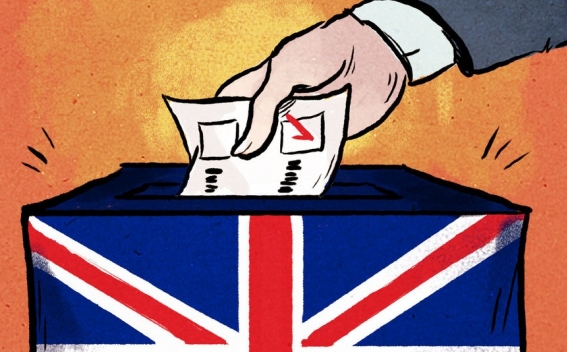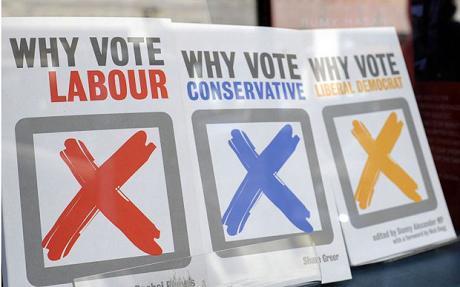 The UK General Elections: A Challenge for Cameron and the Tories
The UK General Elections: A Challenge for Cameron and the Tories

The past weeks of general election campaigns in the
The parties offer different perspectives on the spheres of defense, migration, education, taxation, environment and national health services. The debates among the party leaders have shown the biggest support for UKIP leader Nigel Farage - the most beloved person to be debating, as his artistry is incomparable to anyone else’s. But as it comes to real preferences the Conservatives’ leader and present PM David Cameron and the Labour leader Ed Miliband share the first place, contrary to a couple of weeks ago when Cameron was ahead with some points.
One of the main points of Tory campaign is the referendum on leaving the EU if the latest does not agree to play on their rules. The Labourists oppose this idea. With an unexpected return of the most prominent and beloved former British PM Tony Blair and his view that the referendum will lead to nothing good but "chaos", the Labourists got a significant advantage on this issue. This referendum issue and Blair’s backing of Ed Miliband, turned the wheel into another direction. Now British political leaders are altogether doubting about the merits of an EU referendum, after the business community appeared to also share Tony Blair's opinion that the referendum would cause "chaos" and discourage firms from investing in the UK. This comes to prove business sector representatives will be experiencing great loses in different circles if the
Another important issue in this electoral campaign are the social issues. During one of the debates Cameron said: "We are not saying, ‘believe some forecast’, we are saying, ‘believe the record of creating a thousand jobs a day,’ and if we stick with the plan of keeping taxes low, making Britain an attractive place to invest, go on training the apprentices, build the big infrastructure projects like Crossrail, we can go on creating those jobs."
Opposing him, Miliband is underscoring the effects of five years of the Conservative Party’s austerity policy, the widening inequality gap and the losses of middle income earners. Saying "Cameron tried and failed to defend an economy that is shutting out most working people and an NHS going backwards" is trying to convince the people he will build a recovery that goes beyond the City of
"All based on the idea that it’s only when working people succeed that
As the BBC poll of April 9 shows, since November last year to April this year the parties have only registered some slight changes. As for now the Tory and the Labour are holding the same 33%. Meanwhile the April 8-9 YouGov poll showed 35% for Conservatives, 34% for Labour, 8% for Liberal Democrats, 12% for UKIP and 4% for Greens, leaving some 6% for the others.
As Cameron and Miliband cannot ensure their overweight in the percentage of citizens who are ready to give their vote to them, this elections might become a real platform of action for the small parties, who will in the future help form the majority.

In this light some rumors say Cameron is preparing an alliance with the Liberal-democrats others say he will be cooperating with the UKIP, overall electoral campaign seems to be a clash of the PM and other 6. It should also be mentioned that although Cameron shares the perspective of leaving the EU with the UKIP, he lacks Farage’s dramatism.
Immigration issue is one of the most important ones. As the country is now facing its' hardest times in this regard. On the one side it's the people leaving to join
Cameron's promise in 2010 to decrease migration was not achieved, on the contrary the numbers grow significantly. This is the main card that Milibend plays. He does not have a strong viewpoint, but he is playing on Cameron's failure.
Another factor is the Scottish National Party (SNP), who are said to be the third biggest force in the House of Commons after the Tories and the Labourists. Although
Another thing is that, according to a report released by the Organization for Economic Co-operations and Development, everyone agrees that the EU policy should be changed. According to the recent data received, the
In conclusion it is important to stress that sometimes the thing is not about faces, it’s about parties: will people chose the conservatives again and agree with the radical changes they suggest or will they prefer the Labourists who offer more stability? Or does Tory actually intend to assign a referendum on quitting the EU, if elected or is this just an election campaign?
However, one thing is obvious, Ed Miliband drives his party in a right direction to the victory, which is much likely to happen, notwithstanding the unpredictability of the situation.
Other materials on this subject
- The European Union Has Decided to Abandon Russian Coal In the Summer Many countries have joined these sanctions, even if this necessarily implies economic costs for ourselves," he noted.
- Germany Faces Steep Recession if Russian Oil and Gas Halted, Bank Lobby Says "The situation would be even worse if imports or supplies of Russian oil and natural gas were to be halted. A significant recession in Germany would then be virtually unavoidable," Sewing told journalists.
- EU Leaders Agree on Joint Gas Purchases Last year, the European Commission proposed to the EU countries a system of joint purchases of strategic gas reserves as a way to provide a buffer against possible supply disruptions. Fears of supply disruptions...
- European Union Launches “Team Europe” Package to Support Partner Countries with More than €20 Billion: Reuters Most of the money is being reallocated from other, less urgent EU foreign aid schemes in the EU’s common budget, but Borrell said the European Investment Bank, the European Bank for Reconstruction and...
- The Guardian: EU Leaders Clash Over Economic Response to Coronavirus Crisis Meeting via a video link, the EU’s 27 leaders papered over deep divisions by agreeing that another fortnight was needed to discuss ambitious economic recovery plans. After a testy debate over "coronabonds",...
-
 17:08
17:08The regular session of the Anti-corruption Policy Council takes place in Jermuk
-
 15:05
15:05The Prime Minister sends congratulatory messages to the supreme leader of Iran and the President of Iran
-
 11:11
11:11Armenia sends earthquake aid to Turkey
-
 10:43
10:43Commemoration of the Pontiff St. Sahak Partev
-
 09:16
09:16Some roads are closed and difficult to pass in Armenia
-
 19:55
19:55Phone conversation of the Foreign Minister of Armenia with the U.S. Assistant Secretary of State for European and Eurasian Affairs
-
 18:30
18:30Prime Minister Pashinyan and President Khachaturyan meet
-
 18:20
18:20Ararat Mirzoyan with Co-Chairman of the OSCE Minsk Group of France Brice Roquefeuil
-
 17:01
17:01Humans could land on Mars within 10 years, Musk predicts
-
 16:45
16:45France, US urge 'immediate' end to Nagorno Karabakh blockade
-
 16:01
16:01Blockaded Nagorno Karabakh launches fundraiser to support quake-hit Syria
-
 15:59
15:59Earthquake death toll in Turkey rises to 18,342
-
 15:43
15:43Ararat Mirzoyan Held a Telephone Conversation with Sergey Lavrov
-
 15:06
15:06French president rules out fighter jet supplies to Ukraine in near future
-
 14:47
14:475 Day Weather Forecast in Armenia
-
 14:44
14:44President Vahagn Khachaturyan wrote a note in the book of condolences opened in the Embassy of Syria in Armenia
-
 14:20
14:20Azerbaijan’s provocations impede establishment of peace and stability – Armenian FM tells Russian Co-Chair of OSCE MG
-
 12:57
12:57France representation to OSCE: Paris calls on Azerbaijan to restore freedom of movement through Lachin corridor
-
 11:40
11:40Command of Kosovo forces highly appreciated preparation of Armenian peacekeepers
-
 10:16
10:16The United States withdrew from sanctions against Syria for six months the provision of assistance after the earthquake
day
week
month
Humidity: %
Wind: km/h

